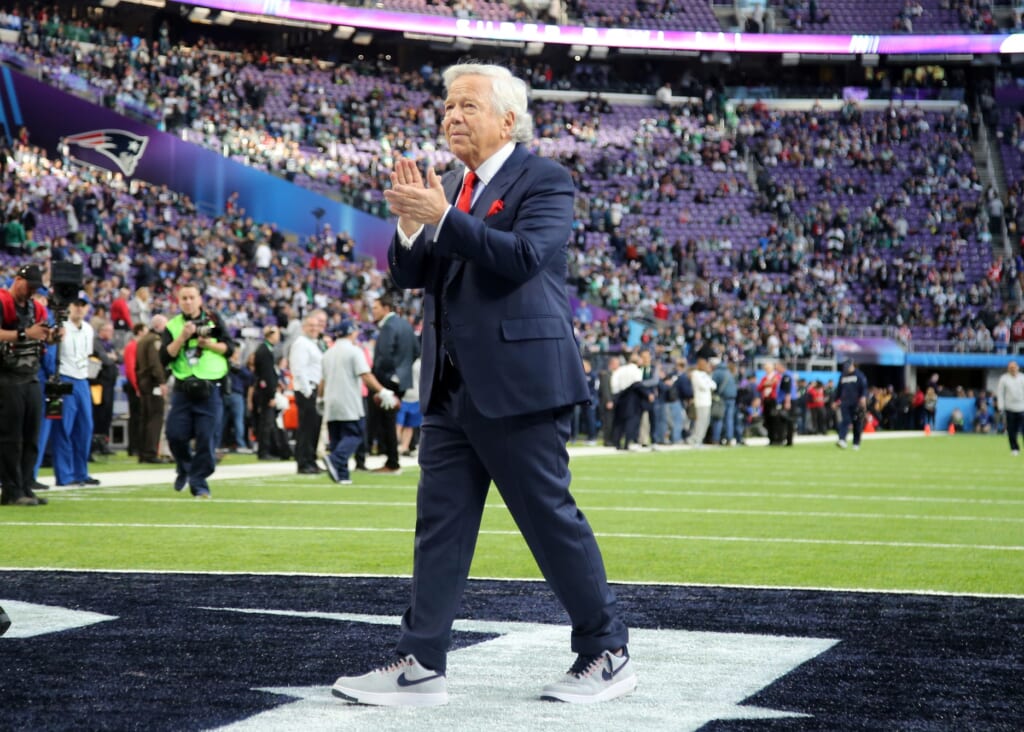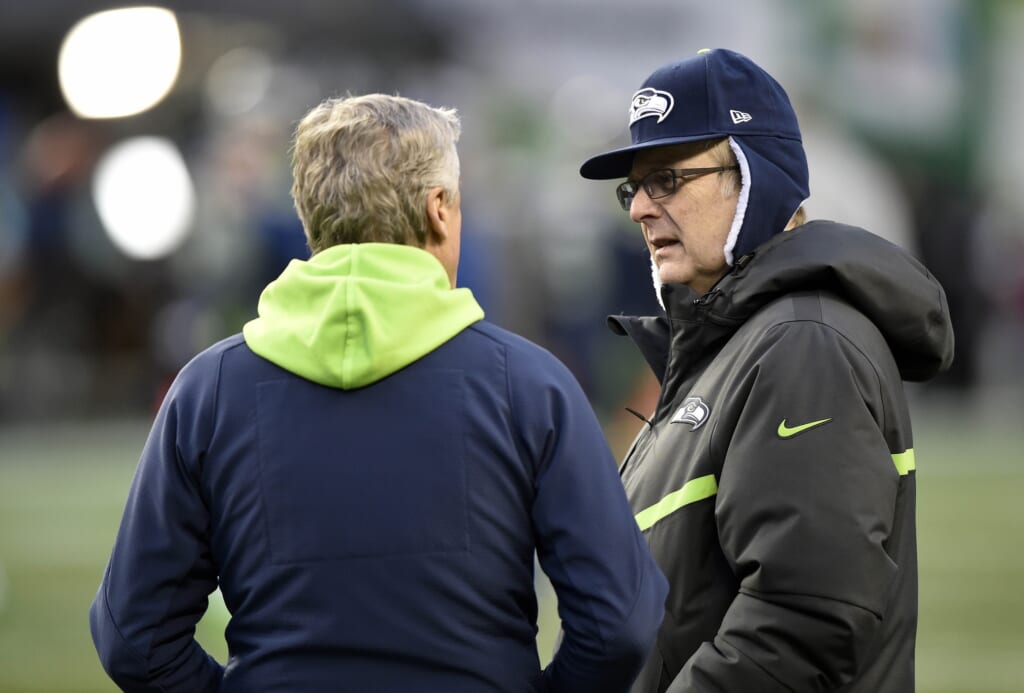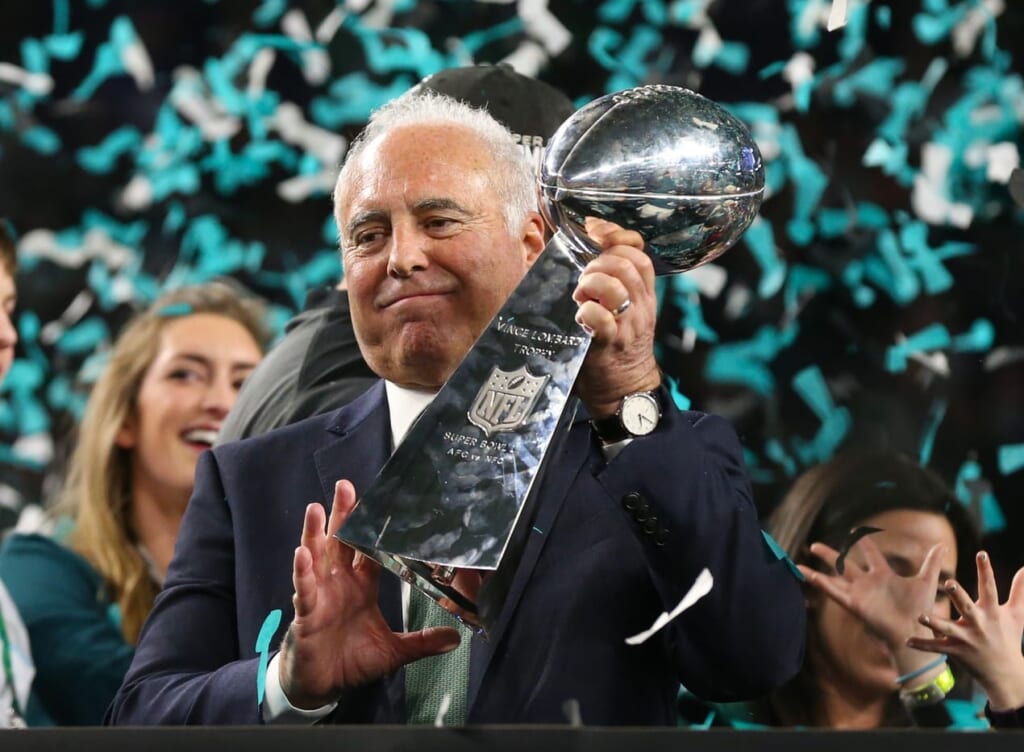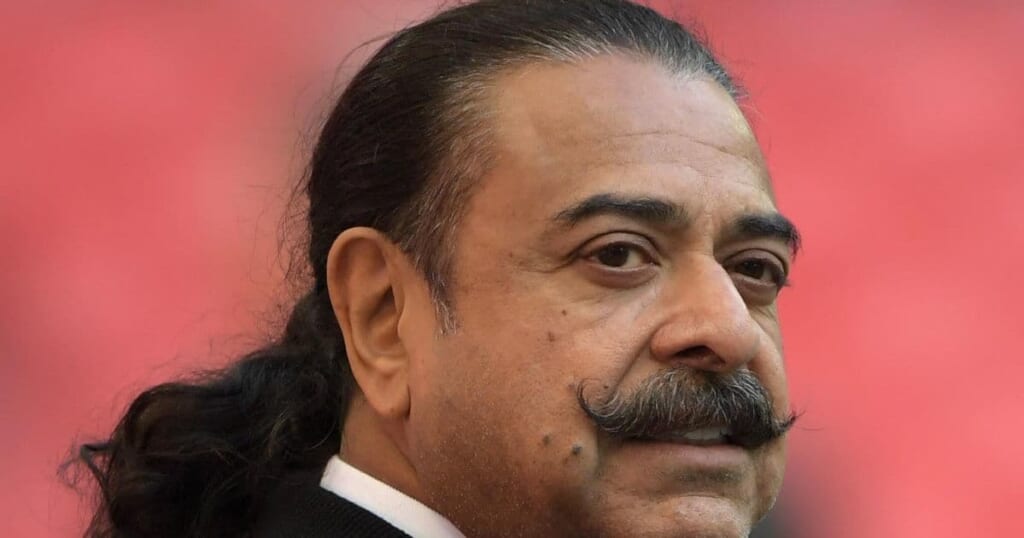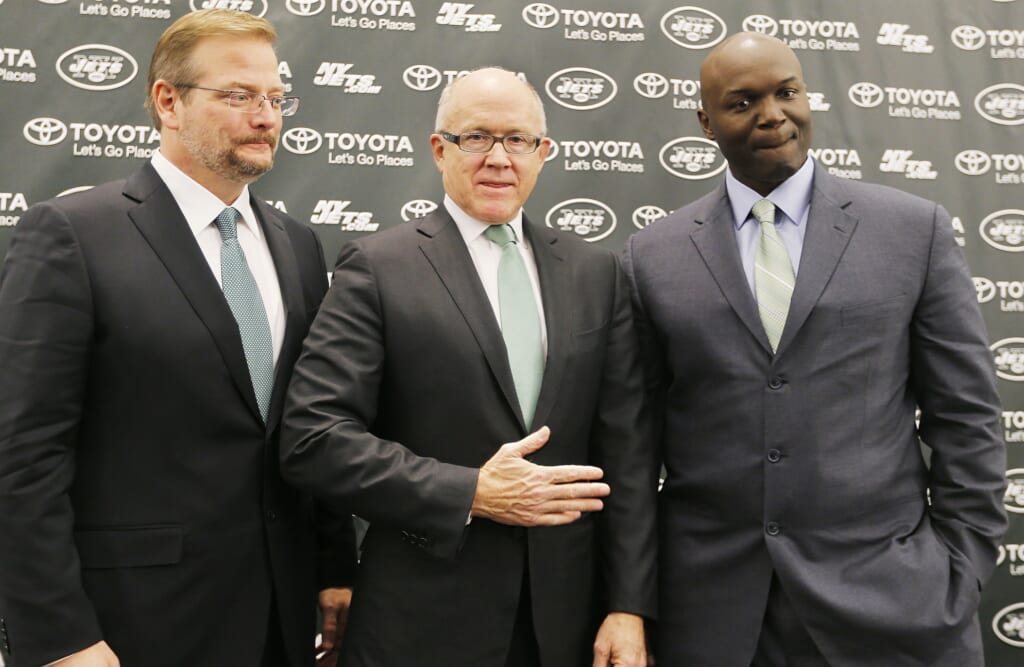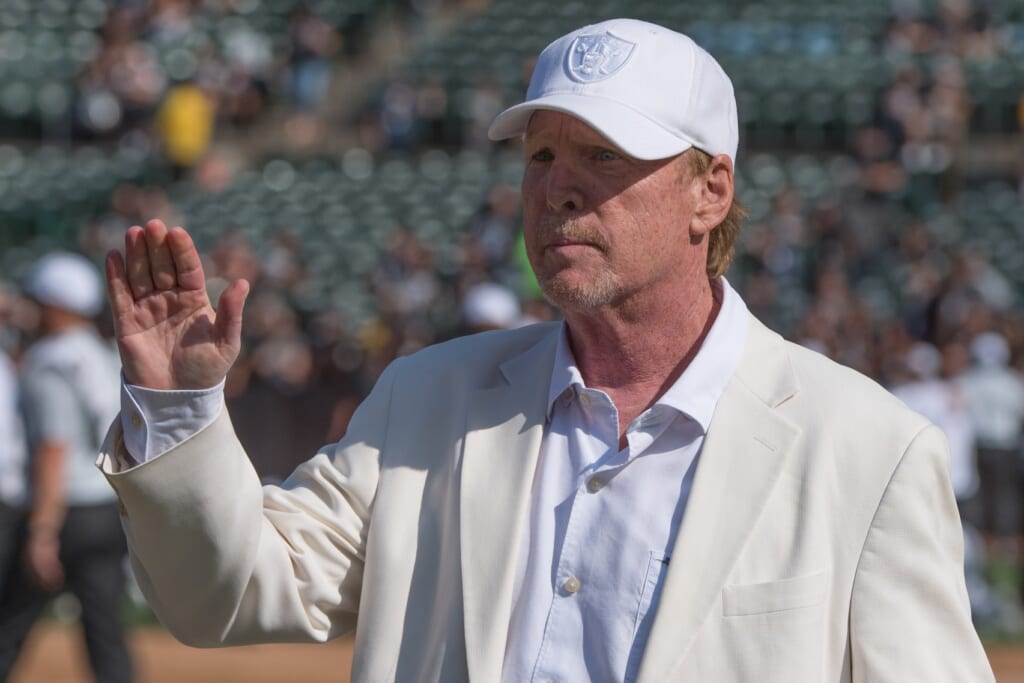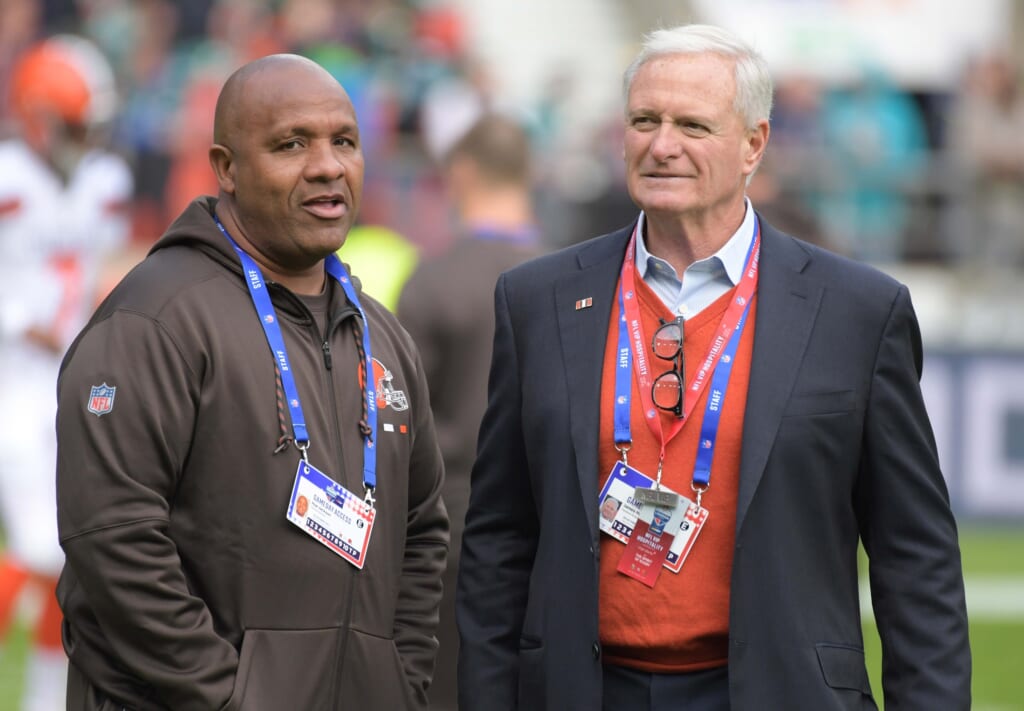
David Tepper is the latest rich man to join the ranks of NFL owners heading into the 2018 season. He replaces disgraced Carolina Panthers co-founder Jerry Richardson in that role. It’s a rare turnover within the ownership ranks.
While most of the names have remained the same, there’s been a ton of changes around the NFL in recent years. Is Jerry Jones still a tremendous owner despite seeing his Cowboys struggle with relevance over the past two decades? Where do longtime owners in Chicago and Cincinnati rank?
That’s what we’re here to take a look at. In ranking the NFL’s 32 owners heading into the 2018 season, we take into account team value and on-field success as well as the mentality of owners and the brands they’re tasked with heading.
Note: All franchise value information provided by Forbes.
1. Robert Kraft, New England Patriots
Having bought the Patriots for a then league-record $172 million back in 1994, Kraft has turned this organization into the true America’s Team. His Patriots have earned nine Super Bowl appearances and five Lombardi trophies in less than a quarter century with Kraft running the ship. In their latest valuations, Forbes notes that the Patriots are worth a cool $3.7 billion. That’s some insane stuff right there.
2. Art Rooney II, Pittsburgh Steelers
After taking majority ownership of the Steelers following his father’s passing in 2007, the younger Rooney has kept the family business alive and well in Steel Town. They won the Super Bowl in his second season as majority owner and have missed the playoffs just three times since. During that span, Pittsburgh has won double-digit games seven times while seeing its team value increase from $929 million to $2.45 billion. Not a bad decade at the helm, right?
3. Jerry Jones, Dallas Cowboys
We can focus on the Cowboys’ lack of recent success as a reason to drop Jones in the rankings. After all, the team has won a grand total of two playoff games since the 1996 season. We can also point to Jones’ spat with Commissioner Roger Goodell and his take on the national anthem controversy as a reason to downvote him.
That’s fine. But it’s hard to argue just how much of a bully he’s built in Big D. Back in February of 1989, Jones purchased the Cowboys for a cool $140 million. Nearly three decades later, and the organization is worth an NFL record $4.8 billion. During that same near three decade span, Dallas has won three Super Bowls. It’s hard to argue against this success when ranking NFL owners.
4. Paul Allen, Seattle Seahawks
The co-founder of Microsoft, Allen was already among the wealthiest Americans when he purchased the Seahawks back in 1996. He did so as a way to keep the Seahawks in Seattle after then-owner Ken Behring threatened to move the organization to Southern California. Since, the Seahawks have opened up a state-of-the-art venue, have seen their valuation hit $2.43 million, earn three conference titles and a Super Bowl championship — the latter being the first for the franchise. Yeah, Allen has done wonders for the Seahawks.
5. Clark Hunt, Kansas City Chiefs
Following the death of his father in 1996, two of Hunt’s siblings inherited control of the original AFL franchise. Though, he became the head of day-to-day operations. After losing 23 of their initial 32 games under Hunt’s leadership, wholesale front office changes created one of the most consistent organizations in football. And while the Chiefs have failed to win that elusive first title since his father was in his heyday, the younger Hunt has led an organization that’s earned eight playoff appearances over the past two decades. It’s his model that’s led to consistent success. That’s hard to come by, especially when we’re talking about what could have been a power struggle following Lamar Hunt’s passing.
6. Steve Bisciotti, Baltimore Ravens
The original Cleveland Browns, this organization went through widespread changes when Art Modell sold 49 percent of the franchise to Bisciotti back in March of 2000. Baltimore would ultimately win the Super Bowl less than a calendar year later. Then, in 2004, Bisciotti purchased the remaining 51 percent of the organization to take full control.
Since then, Baltimore has earned seven playoff appearances and a second Super Bowl title in franchise history. Having purchased the club for less than $650 million, Bisciotti has seen the Ravens’ value increase to $2.5 billion in less than 15 years. Sure they have dealt with the drama surrounding both Ray Rice and Ray Lewis, but this remains one of the consistently good organizations in the NFL.
7. John Mara and Steve Tisch, New York Giants
The son of the legendary Wellington Mara, this billionaire joined the Giants’ organization in 1988 and served in a variety of roles prior to his father’s passing in 2005. Under his leadership and with Tisch taking on a 50 percent stake, the Giants won two Super Bowls against the heavily favored New England Patriots. They also played integral roles in building the new Meadowlands Sports Complex and have already hosted a Super Bowl. Financially, the Giants were valued at $890 million when the older Mara passed away. They’re now worth a cool $3.3 billion, which represents a much larger increase than the average NFL team during that span. Not too shabby.
8. Jeffrey Lurie and Christina Weiss Lurie, Philadelphia Eagles
Fresh off their first Super Bowl title in franchise history, the Eagles themselves are a popular team around the sports world. Obviously, on-field success has played a role here. But the organization’s willingness to support its players’ rights to be politically active and protest has led to an increase in popularity in recent years. Having purchased the team from then-owner Norman Braman back in 1994 for less than $200 million, this power couple has seen the organization’s value increase to $2.65 billion in less than a quarter century. During that span, Philadelphia has earned 13 playoff appearances, two conference titles and a Lombardi.
9. Arthur Blank, Atlanta Falcons
The co-founder of Home Depot, Blank was worth well into the billions before he bought the Falcons from Taylor Smith, the son of the franchise’s founder, in 2002. That came after the Falcons won a grand total of four playoff games since their inception back in 1966. Since then, the Falcons have won six playoff games and one conference title. Behind the scenes, Blank played a role in the team acquiring a new venue, which will host this season’s Super Bowl. Oh, and the franchise is now worth more than five times what Blank bought it for earlier in the millennium.
10. Zygi Wilf, Minnesota Vikings
The Vikings were finally able to move out of the rundown Metrodome recently, only to open up the magnificent U.S. Bank Stadium in time to host last year’s Super Bowl. The venue itself revitalized the Minneapolis area, and will do wonders moving forward. That’s one of the many things the Wilfs have accomplished since purchasing this franchise from Red McCombs for $600 million back in 2005. After just over a decade, the team is now worth a cool $2.4 billion. On the field, Minnesota has earned five playoff appearances in 12 seasons under the Wilfs, including a spot in the NFC Championship Game last year.
11. Stan Kroenke, Los Angeles Rams
A power player if we’ve ever seen one, Kroenke remains a highly volatile figure around the NFL world. He orignally bought a stake in the Rams following their move from Los Angeles to St. Louis back in 1995. Fifteen years later, he gained full ownership by acquiring the remainder of the franchise from the estate of late-owner Georgia Frontiere. And within six years, the Rams were back in Los Angeles.
It’s an amazing dynamic to look at. These Rams went from the Edward Jones Dome in the Midwest to being the primary entity responsible for the near $5 billion Hollywood Park location, set to open in time for he 2020 season. A financial wizard, Kroenke’s total buy price for the Rams was $750 million. They’re now worth a cool $3 billion, a number that will certainly hit near $4 billion when the Inglewood location opens up. Whew.
12. Shahid Khan, Jacksonville Jaguars
Much like Kroenke, Khan has proven to be an innovator from a financial perspective. A native of Pakistan, Khan’s journey to the United States as an immigrant included a stay at the University of Illinois YMCA for a cool $2 a night. In 1980, Khan purchased the automotive manufacturing company Flex-N-Gate, and the rest is history. A billionaire before making his way to the NFL, Khan ultimately purchased the Jaguars for a cool $760 million in 2012.
Khan’s business acumen enabled him to create a major off-field brand in Jacksonville, which included annual games overseas in London. Such international fanfare has seen the Jags’ franchise value increase to $2.08 billion in less than six years. On the field, they’re coming off a narrow AFC Championship Game loss to the New England Patriots. It represented Jacksonville’s first playoff appearance since 2007.
13. Amy Adams Strunk, Tennessee Titans
It’s hard to gauge just how effective of an owner Strunk is going to be. The daughter of late Titans owner Bud Adams, she took control of the team back in 2015. Prior to that and following her father’s passing in 2013, Strunk’s sister, Susie Adams Smith, had control of the organization. Valued at $1.16 billion when she took over, the Titans are now worth a cool $2.05 billion. They’re also coming off a surprising playoff appearance and seem to have front office continuity for the first time in a long while. Not a bad three years.
14. Bowlen Family Trust, Denver Broncos
Despite having relinquished control of the Broncos due to complications from Alzheimer’s disease back in 2014, Pat Bowlen should still be considered the major component to Denver’s ranking on this list. Joe Ellis has since taken over control with a family battle brewing between Bowlen’s kin. Even then, he’s followed the same model that saw the Broncos earn seven conference titles and three Lombardi’s under Bowlen’s watch. Oh, and Denver boasts the NFL’s best winning percentage since the Bowlen family purchased the team back in 1984.
15. Jim Irsay, Indianapolis Colts
Following his father’s death in 1997, Irsay was involved in a legal battle for control of the team with his stepmother. Eventually, Irsay became the youngest owner in the NFL at the age of just 37. Certainly, there’s been ups and downs here. The executive’s battle with substance abuse led to an NFL-imposed suspension.
But he has run a tremendous business in the back end, leading to both success on the field and from a financial perspective. In the 21 years since taking control, Indianapolis has earned 14 playoff appearances and a Super Bowl title. Prior to him taking the helm, Indy had earned a playoff spot just three times in two decades. Financially speaking, the Colts have seen their team value double since the turn of the century.
16. Green Bay Packers
The Packers are interesting in that they’re actually publicly owned. That’s why we’re able to fully understand the annual league-wide revenue amount every year. This doesn’t mean fans themselves have an input in personnel and front office decisions. Instead, that’s left up to CEO Mark Murphy, who has been in that role since 2007. During that span, Green Bay has earned nine playoff appearances and a Super Bowl title in 11 years. The Packers have also seen their franchise value increase from a No. 17 ranking ($929 million) in 2007 to a current value that ranks 13th at $2.55 billion.
17. Christopher and Woody Johnson, New York Jets
Now that Woody Johnson has taken on a role in the Trump Administration, his brother is the temporary head of the Jets’ football club. The great-grandson of Johnson & Johnson founder, Robert, Woody purchased the team for just $635 million back in 2000. In the 17 years since, the Jets’ value has increased to $2.75 billion. In addition to a new venue in Jersey, this has somewhat made up for the lack of on-field success for the Jets. Even then, this organization has struggled fielding a contending team since earning two consecutive AFC Championship Game appearances in 2009 and 2010.
18. Martha Ford, Detroit Lions
Ford’s presence as the Lions’ owner has been short lived. Once her husband died in 2014, she took over full ownership of an organization that was originally purchased for a cool $4.5 million in 1963 ($36.9 million in currant day value taking into account inflation). Despite her advanced age (92), she’s still involved in the day-to-day operations of the franchise.
One of the primary reasons we rank Ford so high is her willingness to make the difficult front office changes to help this organization move on from the difficult times of the past. That included a major overhaul back in 2015 — less than a year after her husband passed. Since taking over the helm, Detroit has earned two playoff appearances in four seasons. The team had made the playoffs just once over the previous 15 years.
19. Kim and Terry Pegula, Buffalo Bills
The Bills’ franchise as a whole has been a laughingstock for some time now. But with this power couple, we only have a few years to analyze. They acquired the Bills back in 2014 following the death of founder Ralph Wilson, outbidding the likes of Donald Trump in the process. The purchase price was $1.4 billion — only $200 million less than the Bills’ current value. It’s a number that ranks dead last in the NFL. Even then, Buffalo is coming off its first playoff appearance since 1999. Things could be turning around with these two widely popular figures heading the organization.
20. Bob McNair, Houston Texans
A key figure in expansion, McNair was awarded the yet-to-be named Houston expansion franchise in 1999. In their 16 seasons of existence, the Texans have earned four playoff appearances — all coming within the past seven years.
Off the field, McNair has proven to be the elite businessman that made him a popular choice to head the expansion franchise years back. Having already paid off the $500 million loan he took to create the expansion team, McNair’s Texans rank No. 8 in total franchise value at $2.8 billion.
21. Virginia Halas McCaskey, Chicago Bears
Now the oldest owner in the NFL, McCaskey took control of the Bears following her father’s death back in 1983. Initially, it went swimmingly with Chicago earning a playoff spot in seven of her first eight seasons. That included the franchise’s first and only Super Bowl title. Unfortunately for fans in the Windy City, it’s been downhill since. Chicago has earned just one playoff appearance since losing the Super Bowl in 2006 and has won a total of 17 games over the past four seasons. With a heralded history and built-in fan base, the Bears still do remain a brand. They rank seventh among NFL teams in total value at $2.85 billion.
22. Gayle Benson, New Orleans Saints
After a protracted legal battle with her in-laws, Benson became owner of the Saints following the death of long-time franchise head Tom Benson back in March. In reality, we’re not even in position to rank what she’s done over the past several months. If she does follow her late husband’s lead, the Saints will certainly be in a good position moving forward. They earned five playoff appearances and a Super Bowl title in the final nine years of his life.
23. Mark Davis, Oakland Raiders
He’s no Al Davis. That’s the honest truth. And it has impacted the Raiders in a big way since his father’s passing in 2011. Largely responsible for the modern NFL, the older Davis legit built Raider Nation. It included huge fan bases in both Southern California and Northern California. Unfortunately, support has eroded in recent years — a fact that’s been brought up recently with the Raiders’ decision to relocate to Las Vegas in time for the 2020 season.
Since Al’s passing in October of 2011, the Raiders have earned just one playoff appearance without a single postseason win. During this span, the team has finished with four or fewer wins three times. The positive news is that Oakland’s team value has increased from a No. 31 ranking ($761 million) back in 2011 to a No. 19 ranking ($2.38 billion).
24. Denise DeBartolo York, San Francisco 49ers
The Yorks continue to get a ton of flack from the faithful. And for good reason. Some will point to moving from San Francisco to Santa Clara as a reason for criticism. Though, the city of San Francisco didn’t do itself many favors there. Getting a stadium built in California has actually been one of Jed York’s biggest accomplishments as the CEO. That right there is the biggest issue for this once-proud franchise.
Since Denise DeBartolo York gained control of the 49ers from her brother in 2000, they have earned five total playoff appearances and gave themselves one heck of a bad PR cycle with the entire Jim Harbaugh fiasco. The only real positive that can be found here are the financials. Back in 2008, these 49ers ranked 30th in total team value at $865 million. They’re now No. 5 overall with a total value of $3.05 billion, a decade later.
25. Bryan Glazer, Tampa Bay Buccaneers
The Buccaneers have been a laughingstock in recent years, the Jameis Winston fiasco being the latest example of that. But it goes much further than this. Tampa has not earned a playoff spot since the 2008 season and has finished in last place seven times during that span. Obviously, the Greg Schiano drama played a major role in this.
Tampa Bay also ranks 28th of 32 teams in total value at less than $2 billion. That’s insane in an NFL where team values and the league’s brand has increased at every turn.
26. Bill Bidwell, Arizona Cardinals
Bidwell has been the principal owner of this organization for nearly 60 years. During that span, the Cardinals have earned just eight playoff appearances with a grand total of 15 winning seasons. This lack of on-field success coincided with multiple relocations, including a move from St. Louis to Arizona back in 1988. Adding to these struggles, the Cardinals continue to fail in building up a real brand. Forbes estimates that they rank in the bottom 10 of the league in franchise value.
27. Stephen Ross, Miami Dolphins
Having purchased 95 percent of the Dolphins from then-owner Wayne Huizenga between February of 2008 and January of 2009, Ross put out a cool $1.1 billion for South Beach-based NFL franchise. Despite ranking 12th in total value at $2.58 billion, things have not gone swimmingly for Miami on the field. Miami has earned a total of one playoff appearance in Ross’ nine seasons at the helm and has seen five different coaches man the sideline. That’s the opposite of continuity.
28. David Tepper, Carolina Panthers
Early reports from Panthers camp are good as it relates to the NFL’s newest owner. Tepper seems to be more in the mold of proactive thinking compared to founder Jerry Richardson, who he bought the team from. Even then, we simply can’t analyze a guy that’s owned this team for less than a handful of months.
29. Jimmy Haslam, Cleveland Browns
Cleveland boasts a 20-76 record since Haslam took ownership midway through the 2012 season. It’s coming off just the second winless 16-game regular season in NFL history and has a total franchise value of $1.95 billion, which is 29th among the league’s 32 teams. It’s been one disaster after another. That includes the decision to create a front office based off baseball’s sabermetrics, with the face of Moneyball helping run the show. Yeah, the mistake by the lake has remained with this new ownership group.
30. Mike Brown, Cincinnati Bengals
No. 30 in total franchise value. Not a single playoff victory since the 1990 season. One of the cheapest organizations in sports when it comes to player spending. Oh, and the desire to keep on a head coach in Marvin Lewis who has proven to be nothing less than a failure. If we’re being completely honest, Brown is lucky to be ranked this high.
31. Daniel Snyder, Washington Redksins
Where to begin? Since purchasing the team from the estate of former owner Jack Kent Cooke in 1999, the Redskins have earned five playoff appearances with two postseason wins during that span. Remember, the Skins had won three Super Bowl in the 18 years prior to Snyder taking control.
Equally as important, an inability to field even a decent front office has led to embarrassment after embarrassment for this once-proud organization. The recent handling of the Kirk Cousins situation being the latest example. Oh, and let’s not forget about the whole Redskins name controversy. The good news? These Redskins rank fourth among NFL teams with a value of $3.1 billion.
32. Alex Spanos, Los Angeles Chargers
We can blame the city of San Diego all we want for that marriage coming to an end. But in reality, it was Spanos’ underhanded dealings that played a vital role in the Chargers moving to Los Angeles and ultimately becoming stepsisters to the Rams in that soon-to-be completed Hollywood Park location.
In reality, the entire debacle that led to these Chargers moving from San Diego to Los Angeles can be placed squarely on the Spanos’ family. Opportunities were abound elsewhere. Instead, they decided to move to a market that’s not necessarily friendly to the Chargers’ brand. And despite this new venue, the Chargers themselves rank 22nd in the NFL in terms of total team value. Ugh.
